The radio station giving hope to listeners in Syria
- Published
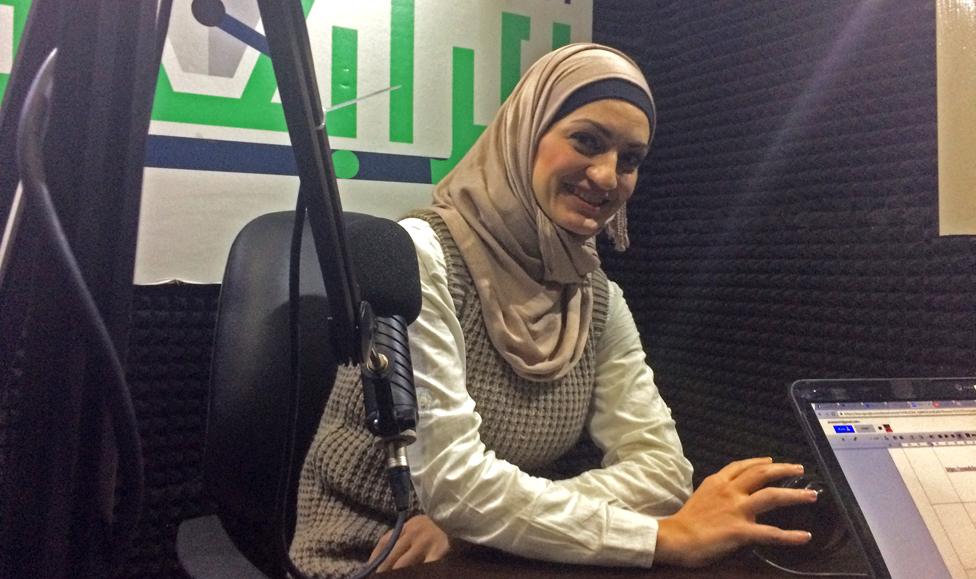
As horrifying war reports are beamed out of Syria, a tiny radio station sends broadcasts in the other direction from Istanbul. Made up of Syrian exiles, the team gathers news from citizen journalists on the ground and has branched out into dramas and comedy shows. But they say the most important thing they provide is hope.
The studio technician patches through the first call of the morning phone-in programme.
"Hello there!" says Sama the cheerful presenter, nodding through the studio window at the engineer on the other side of the glass.
There's a long silence followed by a crackle.
"Hello? She repeats "Hello? What's your point about forgiveness?"
It might be any old radio show in any old country but this is Radio Alwan - an independent Syrian news station which broadcasts out of Istanbul and their calls are coming in from inside the war-torn country. Forgiveness takes on a whole new meaning here. No-one's calling the programme to chat about pardoning a cheating partner or absolving a friend who's stood them up.
The crackle splits and splinters into a male voice. It's a paramedic from Idlib province, south-west of Aleppo. He wants to share a comment a colleague has just posted on Facebook straight after witnessing the massacre of 27 people.
"The only way forward for Syria's future is to forgive and to be forgiven," he says.
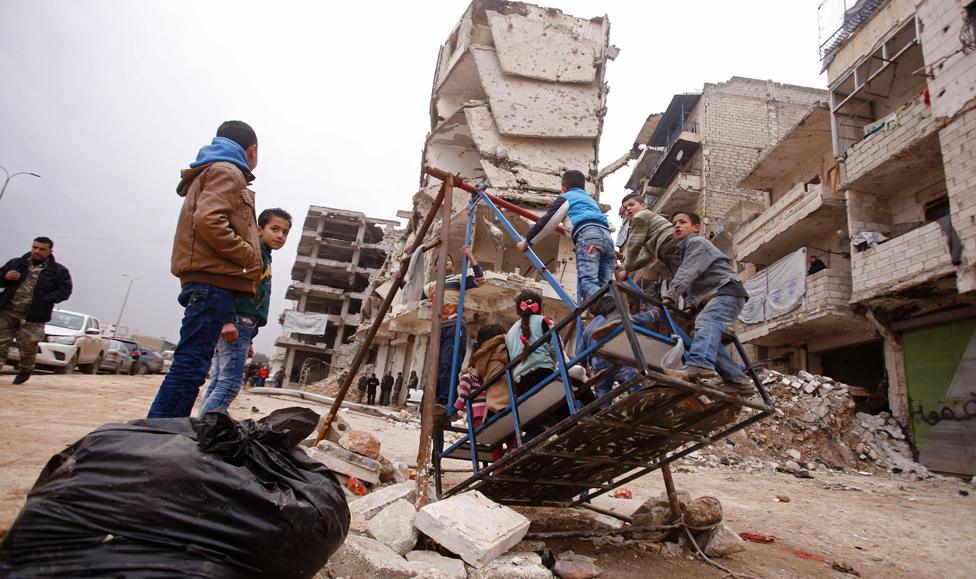
Syrian children play in Aleppo's Salaheddin neighbourhood
In the meeting room after her show is off air, Sama tugs at her hair, buzzing with the emotions that have come down the phone lines into the studio.
"Did you hear the audience?" she asks me. "I mean they all want to forgive - it's just stunning!" She shakes her head in disbelief. "You know, I would have a problem forgiving you if you slapped me or if you took my cup of tea - yet these people inside Syria who suffered bombings and missiles and death - they say we must forgive. The Syrian people are really amazing."
It's certainly humbling. Like all of Radio Alwan's staff, Sama is an exiled Syrian and she still has family and friends stuck in besieged areas.
"Sometimes I can hear the bombing when the listener is talking to me," she tells me. "And sometimes when I hear what they tell me, I just want to die - I want to cry or I want to scream. But this is my job and I have to continue."

Find out more
Listen to Emma Jane Kirby's report about Radio Alwan on the PM programme, on BBC Radio 4

The incessant bloodshed has made continuing extremely difficult for Radio Alwan's news operations, especially in Eastern Aleppo, which was effectively recaptured by government troops last week, not long after my visit to Radio Alwan. Early this year, their local studio in Aleppo was smashed by masked men and their staff attacked. All their equipment was destroyed.
Sami, the station's head of special projects and human resources, sighs.
"It was a difficult decision to take," he admits "But we had to think of the safety of our staff and we closed the office. Now we just have one correspondent on the outskirts of Aleppo and we just pray he is OK."
Sami explains that the station is continuing with a network of civilian journalists who are not professionally trained but whom he says are "incredibly brave" as they chase up news, despite horrific dangers and terrible personal circumstances. He invites his young colleague Dima in from the newsroom to explain how their newsgathering operation works.
"Our sources in eastern Aleppo are two girls," she tells me. "And right now they are stuck - they are trapped in the fighting - and they run from one neighbourhood to another… they have to walk many miles on foot and they are in the path of the war planes and missiles."
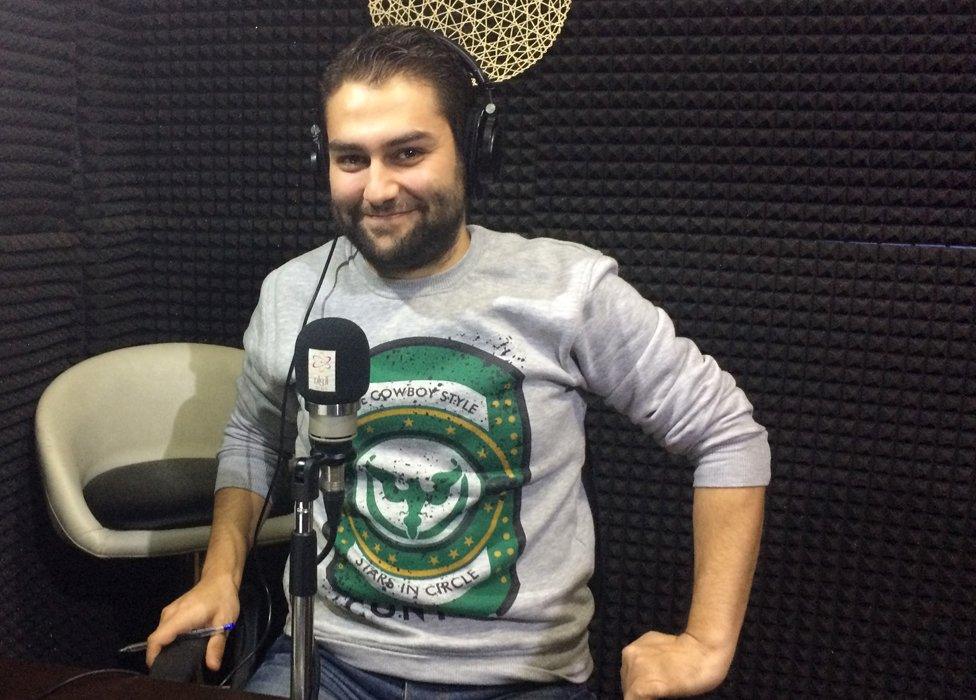
She tells me that one of the women is a teacher and that both women are now extremely frightened because they have often sent video footage and worry they will be recognised, tracked down and punished.
Sami has already told me that it is Radio Alwan's priority to call all of its journalists every single day to check on their safety and their psychological health. He tries hard to "lift them up". But of course, it's not always easy getting hold of someone in eastern Aleppo.
Dima puts her hands to her mouth. "Sometimes we miss them for hours and we call and call… we say, 'Where are you? Please, where are you?'... but there is nothing."
Dima and Sami have reason to be worried about losing contact with their reporters. Last month, their main source in eastern Aleppo, a married man who had recently become a father, was on his way to check the details of a story for Radio Alwan's newsdesk, when his car was hit by a missile strike. As she talks, Dima breaks down.
"His boy was just two months," she cries. "It's hard, but it's real life and every day we deal with sadness."
Sami admits the war has taken its toll too on his Istanbul team who are often racked with guilt that they managed to escape the war. He tells me an evening out can often turn sour for him when he remembers his family and colleagues struggling back home. Ironically he says, it's often those trapped in besieged areas who give Radio Alwan hope.
Mid-morning presenter Sama sighs.
"It's so hard," she says. "Because honestly, right now, I don't believe in hope. I don't feel any hope. But I can't say that in the studio when I am on air. I have to keep talking about hope. The audience tell us that's what they need - hope."
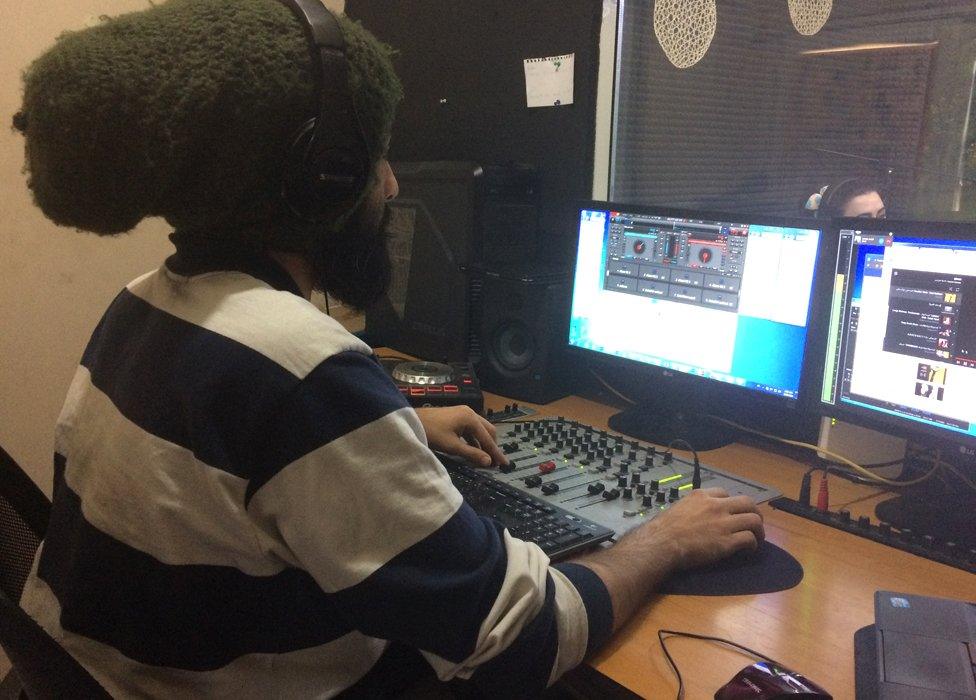
Radio Alwan produces news, dramas and even comedy shows
Radio Alwan sees itself very much as a public service and Sami explains that's why the station has put a lot of resources recently into creating radio dramas, comedy shows and magazine programmes for its listeners.
"The radio is for the people," he insists, "Not for the presenter, the producer or the technician. And the people don't just need to hear bad news, they need diversion too."
He talks me through the new schedule.
Coming up is a practical programme aimed at Syrians who have fled to refugee camps. An expert is on hand to explain to the refugees how to make warmer shelters for the winter months using mud found on site. Another expert will advise on making food and clothing go further.
Sami's very proud of the station's new women's programme that is presented by a woman from Idlib and has attracted a lot of male listeners too. It's broadcast and welcomed in areas where extremist ideology has taken hold, he points out. I tell him about BBC Radio 4's long running programme, Woman's Hour, and he chuckles that it's nice to know Radio Alwan is on the right path. The name of their programme he tells me is Hi Grandma. I make a mental note never to tell Jenni Murray.

How Radio Alwan began
Radio Alwan began in May 2013 as a community radio station in Saraqib, northern Syria
Initially it broadcast for four hours a day from a transmitter mounted on a van
Alwan's founder, Ahmad al-Kaddour, was forced to leave the country in July 2013
The station now transmits daily programmes on FM from Istanbul to Aleppo and Idlib and over the internet at alwan.fm
"Alwan" in Arabic means "colours" - to reflect its aim of representing the many different groups across Syrian society

In the small gallery, we listen to an excerpt from a twice-weekly comedy sketch, Where Are You My Dear? which features two Syrian shopkeeper characters and a cleaner who banter in the street together. Although I can't understand the Arabic, I find I'm smiling at the voices. Sami looks delighted.
"It's really very clever writing," he grins. "I laugh out loud when I listen. And it is written and produced in Idlib."
Twenty-three-year-old Maram comes to join us wearing dark jeans and a trendy bright green T-shirt. She's the new young face (or rather young voice) behind Radio Alwan's youth strand and she regularly hosts phone-ins on subjects like football kit and football supporters. It gives, she explains, a young generation who have grown up under a backdrop and soundscape of war, something else to focus on.
"I just try to put a smile on their face," she shrugs. "You know, make them think of something normal, something that isn't bombs."
Radio Alwan is currently planning a new drama about the White Helmets, Syria's volunteer civil defence force, but I want to know what's happening in their established soap opera, Sad Northern Nights. It tells the story of widowed Thoraya whose husband has been killed by Assad's forces, her teenage son Karam who has been brainwashed by Daesh and Sariah, a member of the civil defence force who is trying to help them both. It is low-budget and many of the parts are played by members of the newsroom yet the drama is spellbinding.
"It's a true story in a way, even if the actual characters don't exist," Sami reminds me. "We are really telling the same stories we tell in the news - but through the drama we try to tell the story of the Syrian people in a different way, perhaps a less brutal way."
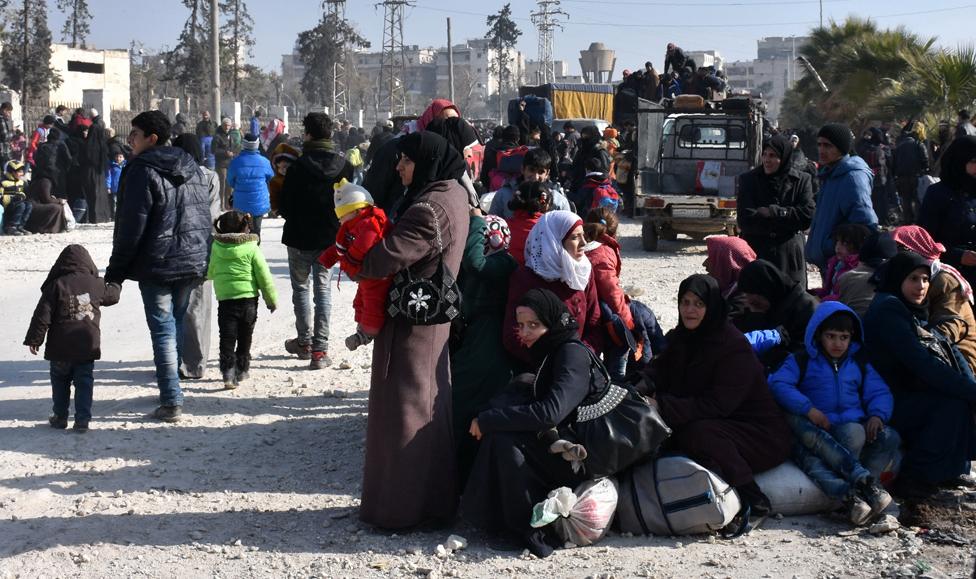
Syrians wait at a checkpoint manned by pro-government forces after leaving eastern Aleppo
And the Syrian audience - who love the drama - were treated at the end of the last series to a truly happy ending. Karam was rescued from Daesh and went back to school, Sariah wooed and then married Thoraya and they even had a baby together. "So, that's it?" I ask Sami. "They all lived happily ever after?"
Sami smiles sadly. "We want to make the drama realistic," he says. "So I think we now have to wait a bit to see what will happen in Syria before we start making series three. You just never know what will happen in Syria… if or when an attack will come."
Later that day, waiting for my plane at the airport, I receive an email from Sami, in which he has attached the last minute of Sad Northern Nights series two for me to enjoy. I hear Sariah chatting cheerfully with his wife about the baby before he picks up his bag and heads out of the door for a meeting with the civil defence force. His footsteps trail off into the night…
And I think of Sami and Dima and Sama back at Radio Alwan nervously calling and calling their correspondents on the ground back home in Syria, willing them to pick up the phone, willing them to return home safely, willing them a happy ending to this war from hell.

Join the conversation - find us on Facebook, external, Instagram, external, Snapchat , externaland Twitter, external.